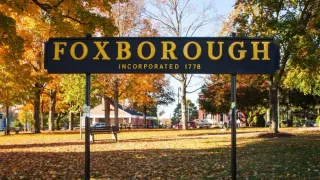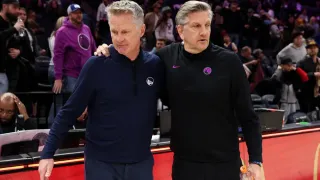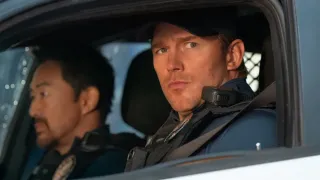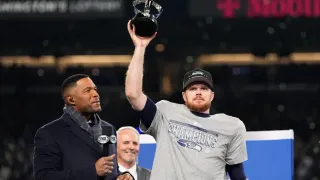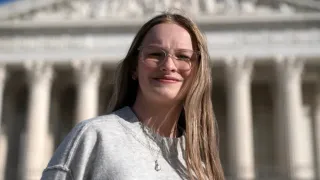December 23, 2017
SF Says Goodbye to Mayor Lee
Matthew S. Bajko READ TIME: 4 MIN.
A grieving city paid its respects to Ed Lee, San Francisco's 43rd mayor and first Chinese-American occupant of Room 200 at City Hall, at a packed memorial service Sunday under the rotunda of what Lee referred to as "the people's palace."
Lee died suddenly last Tuesday at the age of 65 after suffering a heart attack while shopping for apple juice at his neighborhood Safeway store. Thousands of people paid their respects to the civil servant turned politician while his body lied in state inside City Hall Friday, and his friends and family attended a private funeral service Saturday in Daly City.
The public commemoration of Lee's life the next day saw elected leaders from around the country, local celebrities, city employees, and San Francisco residents pack into City Hall for a 90-minute tribute to the "unusual political leader," as Governor Jerry Brown (D) described his friend and fellow lawmaker.
"Ed was a person who had an infectious smile," recalled Brown, adding that, "anytime I got a call from Ed Lee it was a pleasure to talk to him."
Noting that Lee had not sought out being named mayor after Gavin Newsom (D) resigned from the position due to his election in 2010 as the state's lieutenant governor, former mayor Willie Brown said Lee "was different" from all of the city's past mayors.
"He never wanted the job. I am not sure Ed Lee ever wanted any job," remarked Brown, pointing to how he and other mayors recruited Lee, who had been a civil rights attorney, for various positions in their administrations and later urged him to run for the job after initially saying he wouldn't.
Senator Dianne Feinstein (D-California), the city's first female mayor who played a part in convincing Lee to run for the position, recalled Lee not only as a "steadfast champion for human and civil rights" but also as someone who was "incredibly effective in government management."
Newsom joked that Lee had a reputation as being "uncool" but was friends with "the coolest people on earth," like former San Francisco 49ers quarterback Joe Montana and Giants great Willie Mays.
Lee was "a tribute to decency," added Newsom, "a person beloved but in so many ways underappreciated" who "never sought the public spotlight."
Lee's daughters, Tania and Brianna, thanked the public for the support they and their mother, Anita, had received and announced they had set up a charitable fund in their father's name at the San Francisco Foundation to support programs for the homeless and affordable housing, fighting discrimination, and protecting immigrants and the environment. It was Lee's "absolute love for the city," they noted, "that kept him going."
None of the speakers at the memorial were from the LGBT community or directly referred to Lee's support of LGBT issues and causes. But as the Bay Area Reporter noted last week, the mayor left a lasting legacy on LGBT rights, from appointing the first bisexual and HIV-positive members of the Board of Supervisors to being a national voice opposing policies that discriminated against LGBT individuals.
He was a leading proponent for transgender rights, naming the country's first mayoral adviser on transgender issues, and backfilled tens of millions of dollars in federal HIV/AIDS funding cuts.
Images included in a photo montage shown prior to the start of Sunday's memorial showed Lee with various LGBT officials as well as attending the city's annual Pride parade and the yearly dedication ceremony for the pink triangle installation on the side of Twin Peaks.
The creator of the display, Patrick Carney, and his husband, Hossein Carney, who were married by Lee in a private ceremony held in his mayoral office, were among the first people in line for Sunday's service. Patrick Carney recalled asking Lee when he became mayor at the Pride flag raising ceremony in early June that year if he could send goats up to the public park to clear out the poison oak and how, within minutes, Lee had worked it out with the public works director.
"The goats were up there the next day. He spoke that year at the pink triangle (as well as other years - four times in total)," Carney, a member of the City Hall Preservation Advisory Commission, told the B.A.R. "He not only did his best to support equal rights for LGBTQIs but for all groups, famously starting with the Chinese community as a housing activist 45 years or more ago."
Hossein Carney, like so many others, said he would most remember Lee's smile and how "humble and so down to earth he was."
Nearby in line were Ken Maley and his husband, Firat Yener, whom the mayor also married in his office. Friends with Lee for two decades, Maley said, "He was so sweet" and remained so even after becoming mayor.
"You could sit down with him at lunch and have a lovely chat," recalled Maley, who often dined with Lee at Zuni Cafe on Market Street. "He didn't push any agenda."
Paul Henderson, a gay man who worked for Lee as a deputy chief of staff and is now interim director of the Department of Police Accountability, said he would most remember Lee's "leadership and elevating the standards for public service." Noting that Lee championed the disenfranchised, LGBT individuals, and people of color, Henderson added that "having an ally in leadership is invaluable."
Rebecca Prozan, a lesbian who worked with Lee in the Brown administration in the 1990s on the implementation of benefits for domestic partners, said Lee "defined public service. His heart was always in the right place, and we are a better city because of him."
